US Expert Jonathan Schanzer reports on Israel, Ukraine and Iran
The most recent webinar for the Australia/Israel & Jewish Affairs Council (AIJAC) was given by Dr Jonathan Schanzer, the Senior Vice President for Research at the Foundation for the Defense of Democracies, and a former terrorism finance analyst at the US Department of the Treasury, whose topic was, ‘Iran, Russia and a Potentially Disastrous New US Brokered Nuclear Deal’.
He explained Israel faces challenges as it tries to contribute to efforts against Russian leader Vladimir Putin while defending its own interests, likening it to walking a tightrope.
Israel urgently needs to operate in Syria, and Putin holds the key there and has deployed deadly S400 anti-aircraft systems. Israel needs to stop Iran from smuggling the extremely accurate Precision-Guided Missiles (PGMs), which can evade Israel’s missile defence systems, through Syria to Hezbollah in Lebanon.
He added that Israel has, however, delivered the largest aid package in its history to Ukraine, set up a field hospital there, and is engaging in direct mediation between the sides. He noted Ukraine had requested an Iron Dome battery from Israel but explained this is not practical, because Israel needs all of its batteries to defend itself, and it would take months to train Ukrainians in its use.
He said the situation caused by the US initially allowing Russia into Syria is “putting a huge amount of stress on the Israelis because they truly do stand with the West, they stand with Ukraine, they just cannot express it in the same way as some of the other countries that are…not held over a barrel the way the Israelis are right now by Vladimir Putin.”
He described the negotiations in Vienna for a new Iran nuclear deal as a “train wreck” for Israel as US envoy Rob Malley has been making “one concession after another.” After all the problems with the 2015 deal, Iran is now demanding the US remove its terrorist listing from Iran’s Islamic Revolutionary Guard Corps, “which really sponsors just about every major terrorist group in the Middle East.”
Iran, he added, will get up to US$140 billion in sanctions relief, and is also calling for the IAEA to close four of its files on Iranian nuclear activities, and a guarantee that, if the US withdraws from any deal, it can enrich uranium and install advanced centrifuges to the extent that takes it to within a few weeks of a nuclear breakout.
Russia, he said, had effectively been brokering the deal, and will be the country to process Iran’s spent nuclear fuel and service Iran’s nuclear facilities and will receive billions of dollars for doing so.
He added, “so here you have a guy who is recklessly wielding his ability to fire off nuclear weapons in a conflict that he started, in which he is the aggressor… and right now he is being tapped to possibly be the responsible party that would be really the only country standing in between the Iranian regime and their nuclear program.” Iran, he also noted, is now teaching Russia how to circumvent the sanctions against it.
Schanzer expects to see an escalation of the “war between wars”, meaning Israel attacking Iranian military infrastructure in Iran and Syria, and in cyberspace. If there is a deal, Israel will have to decide whether the IDF is ready to take drastic military or cyber action against Iran’s program, but will likely continue conducting smaller-scale operations, and hope the US leadership changes.
He said it’s not a problem that the US is negotiating, just that it’s caving in, and “this is a recipe for war.” It should instead cut back financial support for Iran and treat its allies in the region better.
If Iran does acquire nuclear weapons capabilities, he expects a cascade of other countries in the region to also seek them, including many with unstable regimes that could be toppled, potentially by Islamists. Iran may not actually use nuclear weapons, but keep them as “the ultimate insurance policy,” as Putin is currently demonstrating.


comments